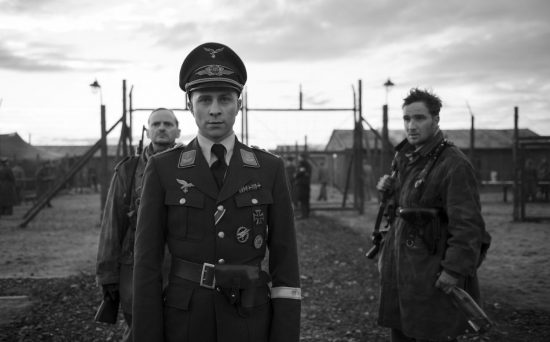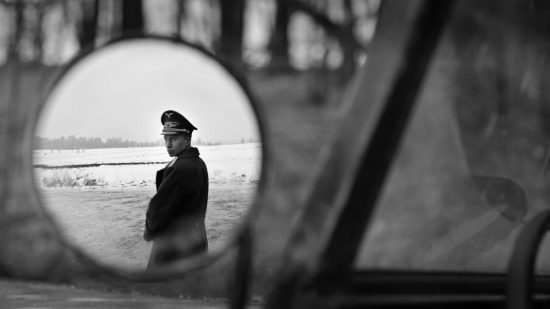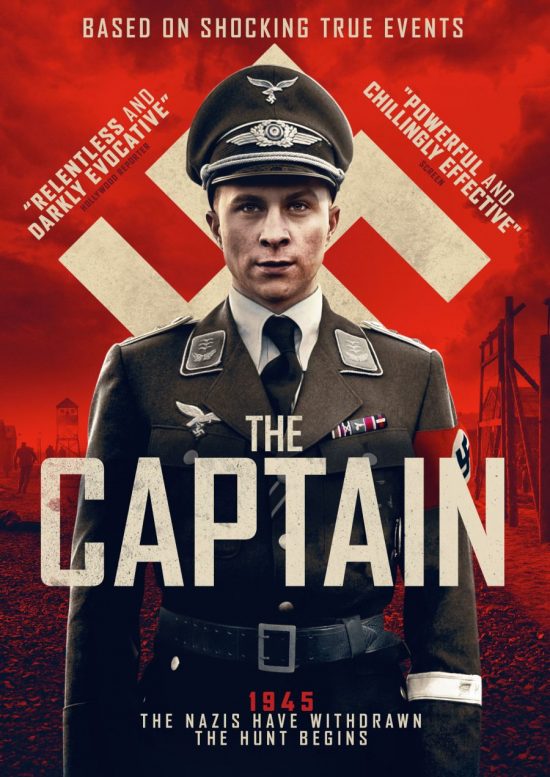Review: The Captain – “Unforgiving, raw and brutally powerful”
Written and directed by Robert Schwentke (The Time Travelers Wife, Flight Plan, Red, Insurgent), The Captain – Der Hauptmann, to give it it’s original title – is a compelling tale of the closing days of the Second World War. Shot in a beautifully crisp, glowing, silvery black and white the elegance of the cinematography is, right from the start, at odds with the brutality at the heart of The Captain, as we see a terrified and oh-so-young German soldier being chased through a winter landscape and woods by his comrades. They are not just hunting him and aiming to kill him, they are clearly enjoying it, especially the officer in charge. Max Hubacher’s soldier is a creature of pure fear, seeing his violent death just a few footsteps behind him, his uniform and boots torn and ruined, his face so filthy only his astonishingly clear eyes looking out of that mess look human.
It is the final days of the war and German has turned on German, no longer just fighting the invading Allies but devouring their own, all civilised restraints are gone, years of the hard-edged Nazi regime coupled with the grinding brutality of warfare has cracked the veneer of civilisation, even the vicious rules of warfare are disregarded. Schwentke’s film, like Apocalypse Now, shows how that red-toothed animal is set loose by endless brutality, and even more alarmingly, how while some refuse that dark call and others try to turn away, some men are seduced by it. They come to like it, revel in that dark freedom that comes when they think there are no more rules, no more consequences.
Hubacher’s Willi Herold doesn’t quite start this way, he is the terrified soldier – a deserter, perhaps, broken by the relentless enemy attacks – being chased and shot at by his former comrades. After eluding them he trudges across country, finding an abandoned staff car, with a suitcase containing a captain’s uniform. Swiftly removing his own ruined uniform this private gives himself an immediate promotion by donning this found uniform, but more than that, as he looks at himself in the car’s mirror he starts to assume the pose, the attitude he expects from a Nazi officer. This is a very young man, remember, who has been brought up in Hitler’s Germany, even before the shock of the war; imagine the role models he has had in his youth, those roles he is now assuming.
When Milan Peschel’s Freytag comes stumbling down the road and reacts to him as if he was a real captain, Herold starts to play the role for real. Taking Freytag as his driver they stop at the nearest village, Herold playing the quiet, icy Nazi officer so well that the locals in the inn are soon too scared of him, providing them with food and lodgings. But there is a price – desertion is now rife as it is clear the Third Reich is doomed, and many of those deserters have been looting and raping their way through the countryside. After catching one those same locals he cowed with his act earlier now call on him to walk the walk for real, to “pay for his roast dinner” as one puts it. As the horrified Freytag watches helplessly Herold agrees with the locals, draws his gun and shoots the deserter right in the street. It is the start of a slide into brutality and depravity.
It isn’t long before Herold encounters more men separated from their units like Freytag – or perhaps they have just given up and deserted – and again he uses his newly borrowed authority to overwhelm them, again playing the arrogant, cold Nazi officer to perfection, exactly the sort of officer they expect. Encountering a group of military police rounding up deserters to take to a nearby camp, Herold expands his authority, telling them all he is on a special mission by order of the Fuhrer himself, to investigate the reports of low morale and desertion behind the lines, snowballing his lies and actions into ever greater levels of brutality and atrocity.
This is not an easy watch, despite the quite beautiful black and white photography; The Captain lays bare an ugly fact of human nature – brutality begets brutality, violence more violence, Herold like one abused who then goes on in turn to become an abuser, a chain of vile cause and effect poisoning the soul. And worse still he starts to enjoy it, to relish it even, and so do a number of the men who fall under the spell of the Captain. And this is very much a man’s world, the only women seen briefly here are at a couple of celebrations, companions for the soldiers, the rest of the time it is men and other men committing acts normal society would repudiate, reminiscent of Hemmingway, perhaps.
The fact that the film is apparently based on a real person and events makes the events all the more horrific.
Hubacher as Herold and Peschel as Freytag both give up some incredible, intense performances in what must have been pretty emotionally-draining roles. Herold takes us from frightened, filthy, dishevelled soldier on the run to the overbearing, cold-faced Nazi officer, face impassive, his clear eyes. He falls so easily into this role the young man must have seen acted out before him throughout his youth in Nazi Germany, but Hubacher also throws in subtle changes in expression and body language early on, as Herold is unsure of himself, waiting to be found out and exposed, and you can see him changing as he realises others are following his assumed authority, no matter how vile his orders. It’s a damned fine bit of acting. Similarly Peschel’s Freytag as the everyman, just an ordinary guy who wants the war to be over, to go home, terrified of being shot by his own side, relieved when Herold takes him in, then the mounting horror in his expression as he witnesses the monstrous acts Herold brings the other soldiers to commit, another superb piece of acting , the two men’s performances playing off one another perfectly to bring emotion, sorrow, fear and utter horror to the viewer. Unforgiving, raw and brutally powerful.
The Captain is released on September 21st.












